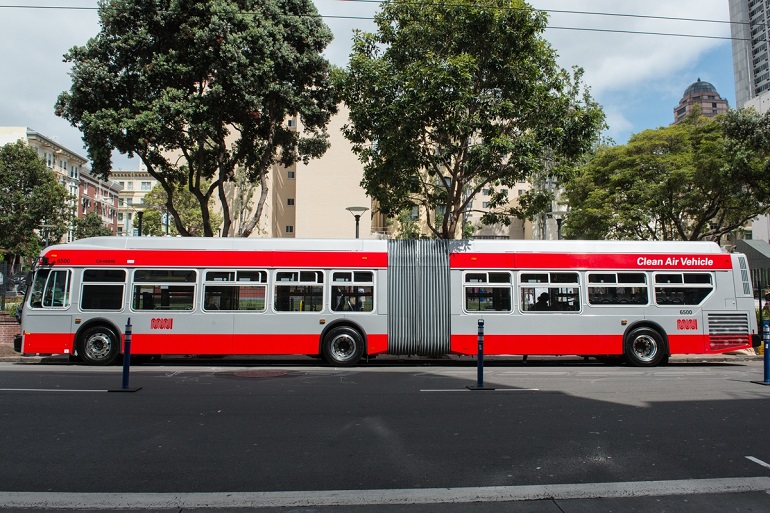What have you done for Mother Earth lately?
It’s a question posed to us all on Earth Day, an international day of reflection and activism to address the environmental health of our planet.
As the agency responsible for running the city’s transportation system, the SFMTA’s policies play a critical role in addressing the city’s greenhouse gas emission goals — and we’ve taken that to heart. Creating a sustainable transportation system isn’t just an ideal for us, it’s key to everything we do.
Tomorrow, our latest commitment comes with the launch of our fourth Muni Forward service increase since Earth Day last year. Today, we’re sharing 10 ways we work to make the planet a little healthier every day.

One of Muni’s new hybrid electric buses unveiled on Earth Day last year.
- We’ve already reached our 2018 goal of having 50 percent of travel in the city done by sustainable means. In 2015, 53 percent of the estimated 4 million daily trips were taken using a means other than a private car
- The SFMTA was one of only four cities to be awarded the Platinum Sustainability status by the American Public Transportation Association for being a leader in sustainable public transportation system and continuing to maintain and improve on our success.
- Our transit fleet is one of the greenest in the nation. Over half of the city’s public transit fleet are zero emission vehicles, running on 100 percent renewable electric power.
- We’re adding new electric trolley coaches, new hybrid buses and light rail vehicles to create a more efficient and reliable Muni. We unveiled the first of our new trolley buses on Earth Day last year.
- Our new electric trolley coaches are equipped with new “smart” features that help keep them on the road longer through self-checks and real time communication with support staff. This helps make transit a more reliable and attractive option.
- In December 2015, Muni buses that formerly ran on B20 biodiesel fuel were switched over to renewable diesel, a cleaner, equally effective fuel source that cuts carbon emissions by 60 percent compared to petroleum diesel or B20 biodiesel. All of our buses that use fuel run on renewable diesel.
- Bicycles are the original zero emission vehicle. As the city’s bike network grows, so does the number of people on bikes. The recently published bike count shows weekday bike trips in San Francisco increased by 8.5 percent from 2014 to 2015 (an increase of 200,000 bike trips), that further reduce our carbon footprint.
- Continuing efforts to redesign streetscapes to make them more livable and pedestrian-friendly have provided safe, effective transportation options to also help reduce our carbon footprint.
- Working with SF Environment, we’re on track to prioritize waste reduction improvements at all agency facilities and maximize related cost savings to meet the city’s Zero Waste 2020 goal.
- 98 percent of taxis regulated by the SFMTA are alternative fuel/zero emission vehicles.
A Leader in Sustainability
San Francisco has long been an international leader in sustainability, often leading the charge with progressive policies that amplify and address world environmental issues like climate change and the documented effects of global warming.
In 2014, President Obama designated San Francisco as a Climate Action Champion for leadership on climate action change, an honor given to only 16 cities in the U.S. who had “considered their climate vulnerabilities and taken decisive action to cut carbon pollution and build resilience.”
Last year on Earth Day, The SF Department of the Environment officially launched the city’s Climate Action Campaign known as 0-50-100-Roots, San Francisco's formula for reaching our greenhouse gas emission reduction goals by 2025. 0-50-100-Roots outlines the city’s plan to achieve zero waste, 50 percent sustainable commute trips and 100 percent renewable energy, along with greening efforts to enhance and to create a more livable city — the Roots component of the campaign.
"Largest Secular Holiday in the World"
Today, in honor of Earth Day, the landmark Paris Agreement is scheduled to be signed by the United States, China, and some 120 other countries. The international environmental treaty to stabilize greenhouse gas emissions as a means of addressing climate change was adopted by the United Nations in December 2015.
Earth Day, celebrated annually on April 22, is designated as a day of global mobilization to demonstrate support for environmental protection. The first Earth Day in 1970 activated 20 million Americans from all walks of life and is widely credited with launching the modern environmental movement.
This year 193 countries will have Earth Day celebrations in what international advocacy group Earth Day Network notes is now "the largest secular holiday in the world, celebrated by more than a billion people every year."
Learn more about the green movement, enjoy multicultural entertainment on three stages, hear keynote speakers and more at San Francisco’s free Earth Day Festival. The all-day event takes place tomorrow at Valencia and 22nd streets.